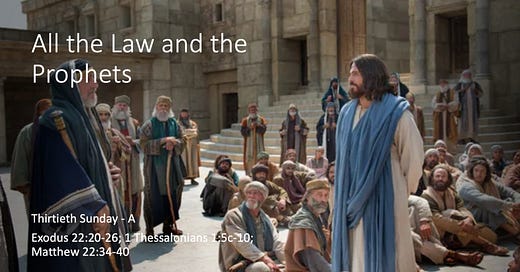Exodus 22:20-26; 1 Thessalonians 1:5c-10; Matthew 22:34-40
The love of God and neighbor is at the center of today's liturgy of the Word (Matt. 22:37-39). The conversion of Thessalonians from idols "to serve the living and true God” shows their love for God (1 Thess. 1:9) and the concern for foreigners, widows, and the poor exemplifies the love of neighbor (Ex. 22:20-26).
"Teacher, which is the greatest commandment in the law?" (Matt. 22:36). As with the taxes to Cesar, the Pharisees were not concerned with the answer. They asked to put Jesus to the test (Matt. 22:35). For the first time, the word "to tempt" appears in the story of Jesus' temptation where Satan is called "the tempter" (Matt. 4:1,3). The Pharisees tempted Jesus four times: with the Sadducees (Matt. 16:1), with the Herodians (Matt. 22:15-18), and then twice alone (Matt. 19:3; 22:35). Moreover, they accused Jesus of casting out demons by the power of Beelzebub (Matt. 12:24) and were the first to plan His destruction (Matt. 12:14; Mark 3:6).
There is a shocking paradox in the Gospel. Those who call Jesus "teacher" do not plan to become his disciples; those who do not obey the law (Matt. 23:1-2) dare to ask about the greatest commandment in the law; those who stand before the icon of the invisible God (Col. 1:15) instead of loving him with all their heart, soul and mind, put him to temptation. Therefore, from the entire palette of 613 commandments in the Torah, Jesus chooses two commandments that begin with the verb "love" to show them what is the most important in life and what they lack: if I have no love, "I am nothing" (see 1 Cor. 13:1-3).
Every scholar of the law is exposed to two dangers. First, to identify the love of God with the love of the Law. "Oh how I love your law! It is my meditation all the day" (Ps. 119:97). The one who devotes his heart, soul, and mind to studying the Law may forget that the greatest commandment in the law is to love the Giver of that Law (Deut. 6:5). Another danger that lurks for a scholar of the Law is contempt for other people: "God, I thank you that I am not like other men" (Luke 18:11). The Pharisees considered the ordinary people of Israel who did not know the Law to be accursed (John 7:49; see John 9:1-34).
Coming down from Mount Sinai Moses carried two tablets. On the first were written the commandments related to God and on the second were those related to man. But when he saw the golden calf he broke both of them (Ex. 32:19). It is impossible to separate the love of God and the love of neighbor. Whoever transgresses one commandment transgresses all of them (James 2:10). The one who says that he loves God but hates his neighbor is a liar (1 John 4:20). On the other hand, ethics without God leads to a culture of death of which the twenty century was a tragic example.
"I love You, Lord, my strength" (Ps. 18:2). The preaching of the Gospel is the greatest manifestation of the love of God and neighbor. The one who loves God wants Him to be known and loved by others; the one who loves neighbor wants them to experience salvation in Christ as well. St. Paul ran to the ends of the earth to preach the Gospel of the one who loved him and gave himself for him (Gal. 2:20) and the Thessalonians did not keep the Gospel for themselves but shared it with others (1 Thess. 1:7-8).
On these two commandments “hang all the law and the prophets" (Matt. 22:40). Jesus revealed ”their inseparable unity” in his words and life, but particularly in his death on the cross for our salvation. “The Cross of our Redemption” (cf. John 3:14-15) is “the sign of his indivisible love for the Father and for humanity (cf. John 13:1)" (John Paul II, Veritatis Splendor, 14).




